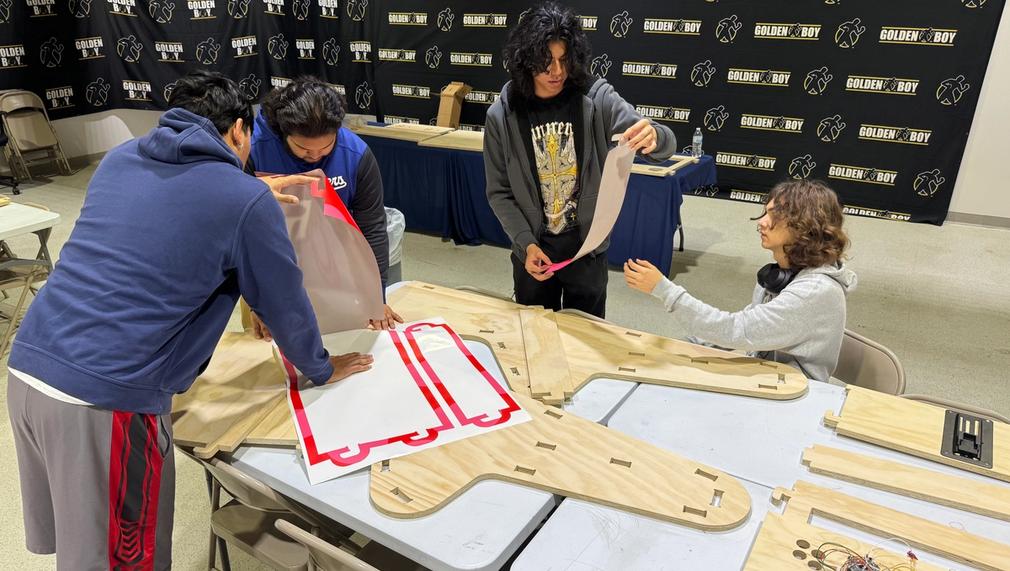DIY Artcade- Learn to Earn
Two Bit Circus Foundation empowers disadvantaged communities through playful, creative STEAM programs that use sustainable materials. Building on 20 years of experience in LA, our DIY Artcade program gives high school students hands-on experience in engineering and entrepreneurship. Students design, build, and launch arcade games as small businesses—gaining the skills and confidence to become not just employees, but future founders and innovators in LA’s creative economy.

What is the primary issue area that your application will impact?
K-12 STEAM education
In which areas of Los Angeles will you be directly working?
South LA
In what stage of innovation is this project, program, or initiative?
Expand existing project, program, or initiative (expanding and continuing ongoing, successful work)
What is your understanding of the issue that you are seeking to address?
By 2030, over 77% of jobs will require tech skills, yet many students, especially in underserved LA communities, attend schools with little access to hands-on STEM and career-connected learning opportunities (U.S. Dept. of Labor). In LAUSD, high schools with large populations of Black and Latino students are less likely to offer advanced STEM courses, limiting students' exposure to critical subjects like computer science and engineering. Meanwhile, engineering degrees are now more common than MBAs among top-performing CEOs, signaling a shift in the skills needed to lead. Without market-driven skills, they face systemic barriers to employment and leadership in a tech-driven world. DIY Artcade fills this gap by transforming students into inventors and entrepreneurs as they design, code, and market arcade games. Without bold interventions like this, we risk leaving behind a generation of students disconnected from the industries shaping their future.
Describe the project, program, or initiative this grant will support to address the issue.
DIY Artcade is a project-based learning program that will teach 40 high school students how to launch and operate their own business. During a week-long intensive, students learn to design, build, and monetize custom arcade games that generate passive income. Working in teams at 2BCF’s new South LA Hub, students will build physical arcade cabinets using industry-grade tools like CNC routers, program original video games using microcontrollers, and integrate lighting, sound, and digital payment systems. Once complete, the program will culminate in a Demo Day where students can pitch to local businesses, allowing them to build confidence, earn revenue, and showcase their final projects to the community. This innovative program blends technical skill-building in engineering, game development, and computer science with essential business skills like marketing and sales. By turning technical learning into tangible, entrepreneurial outcomes, it empowers students to see themselves not just as future employees, but as founders, inventors, and leaders who will shape the future of LA.
Describe how Los Angeles County will be different if your work is successful.
By October 2026, 40 high school students will design and launch their own small business. Using pre- and post-program surveys, we’ll measure increases in students’ content knowledge in engineering, their confidence in applying these skills, and interest in pursuing engineering as a career. Additional success stories and testimonials are collected at the end of the program during Demo Day, where students pitch their completed projects to business partners such as Dave & Busters, Intel, Solidworks, and Two Bit Circus.
Our long-term vision is to develop a replicative program model to scale DIY Artcade clubs through packaging our educator training and curriculum toolkit. Within 3 years, we plan to expand to 20 schools across LAUSD, impacting over 5,000 students. To date, 2BCF has trained 18,210 educators and served 463,600 students across the County. With our legacy and current interest from 3 schools partners, 2BCF has the expertise and community support for successful program expansion.
Approximately how many people will be impacted by this project, program, or initiative?
Direct Impact: 40
Indirect Impact: 5,000